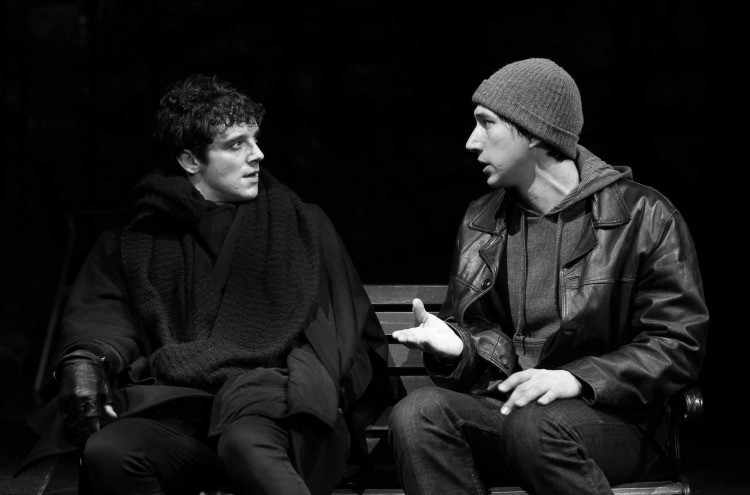Broadway Bias, or the Theatre We're Not Talking About

Initially, I planned on writing about the show I have been working on as assistant dramaturg since February (!), as we have just completed production. Except there are only a limited number of people in the world who could come to see Liza Birkenmeier's The Way Out West at Carnegie Mellon University. And there is an even more limited number of those audience members who also read the Theatrical Board.
Basically, I thought to myself that writing an article about The Way Out West, no matter how wonderful it was, no matter how great my enthusiasm, would be a fruitless effort. To be frank, I thought hardly anyone would care.
So, what did I think people do care about?
Broadway.
...and that's about it.
Since arriving at the School of Drama, I have drastically increased both the amount and the variety of theatre I see. Some of that is a testament to how much my school puts on in a season (I recall one time last year there were six productions all running in the same week). I started thinking about theatre in different places, at different levels of production. But at the end of the day, I still found myself following primarily Broadway productions.
Broadway is ever-present in us theatre people's minds, whether we realize it or not. The Tony Award nominations overtook conversation for a day in classes last year. We're constantly chattering about what new musical, what play revival, what incredible actor, and so on, is coming to the Great White Way. Playbill focuses on New York theatre. The wonderful newsletter Broadway Briefing speaks for itself. It includes some information about the West End and regional productions, but there is no doubt what the core focus is.
Is the immense focus on Broadway bad? I hesitate to give a definitive answer. There are certainly negative aspects to being prepossessed by Broadway theatre, but it isn't harmful to care about what is undoubtedly the center of American theatre, the one that is the most visible to the non-theatre-obsessed public. The problem comes when it blinds us from seeing the theatre all around us, likely smaller but no less powerful. If we really want to support theatre, shouldn't we foster it at home and not just on a few streets in Midtown Manhattan?
Living in North Carolina before college, I was very vocal about theatre not being very accessible. And, in many ways, that was true. But I was so focused on seeing those big Broadway musicals that I missed the absolute wealth of theatre in my area. Sure, we don't have a big regional theatre producing big, new, notable works. (We do have a wonderful performing arts center where many a Broadway tour comes through. But I digress.) Yet there are many different companies that are constantly creating and producing, so many that I would struggle to see everything just in a 15 mile radius from my home.
In a way, that kind of theatre is less accessible. The only people who can see it are the people near it. But all theatre, to some extent, is ephemeral and exclusive. I can't imagine how I would be as an artist without seeing The Death of Hayden Waverly by Lauren Wimmer as part of the New Works series here at Carnegie Mellon. There were maybe a few dozen people in the audience when I saw it. But that didn't stop its enormous power, and it is far from a big Broadway blockbuster.
After my article on celebrities coming to Broadway, I started conversing with reader and dramaturg Shaun Leisher. He responded to my last piece on celebrities coming to Broadway, noting that there are a number of phenomenal stage actors who never make it to Broadway because of these celebrity roles. I brought up the topic of this piece, and he shared some of his thoughts.
"[Broadway] is big theatre and very expensive theatre but it's not THE ONLY theatre nor is it THE BEST theatre," he said. "I think there's no place that is more apparent than in the world of straight plays. I mean how did Lynn Nottage and Paula Vogel just make their Broadway debuts like a year ago? If you've paying attention to the list of the most produced playwrights of the last few seasons in the US you'd notice Lauren Gunderson is close to the top and yet she's never even had a serious production in NY on or off Broadway."
Surely enough, I can name two productions of Lauren Gunderson's The Revolutionists that just finished up recently - one in Pittsburgh, and one near my hometown. I heard her name for the first time only this semester, and now I see her everywhere...everywhere, except Broadway.
Broadway is never going to stop being important to American theatre, at least not as far as I can see. But the immense weight put on it can be harmful to the countless works of art that aren't aiming toward a spot on the Great White Way.
So what I urge is find a small, local production of something. Preferably something that isn't a local production of a big Broadway musical - take a risk on something entirely new to you. And then talk about it.
Change doesn't begin on Broadway. It begins in private play readings, local productions, and regional theaters. Be a part of it. Make noise. Create change. Start small. Broadway can never be everything.
(Photo: The atomic bomb sequence from The Way Out West, a play about the Manhattan Project in 1945 Los Alamos. Photo by Louis Stein.)




